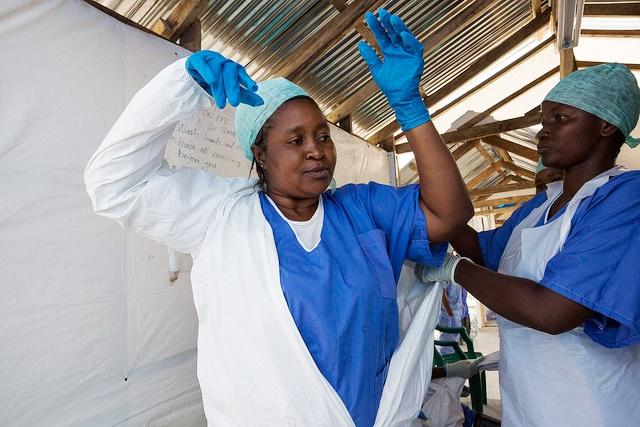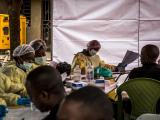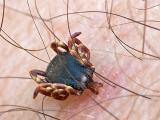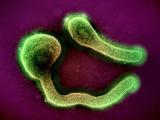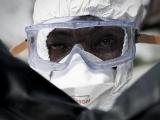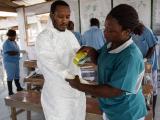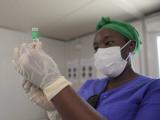The US Centers for Disease Control and Prevention (CDC) today announced the launch of a trial designed to test the safety and effectiveness of the VSV-EBOV Ebola vaccine in Sierra Leone's frontline health workers.
The study, a partnership among the CDC, the Sierra Leone College of Medicine, and the country's health ministry, has a goal of enrolling 6,000 health and other frontline workers, such as burial teams. It and other phase 3 studies in the outbreak region face challenges, given the quickly declining case numbers typically needed to show clear-cut evidence of effectiveness.
VSV-EBOV uses an Ebola virus protein spliced into a vesicular stomatitis virus (VSV). It was developed by scientists at the Public Health Agency of Canada and is licensed by NewLink Genetics and Merck.
At a media briefing today, Anne Schuchat, MD, director of the CDC's National Center for Immunization and Respiratory Diseases, said more than 200 people have already enrolled in the Sierra Leone Trial to Introduce a Vaccine against Ebola (STRIVE), and just over 90 have been vaccinated so far.
A focus on current hot spots
She said the trial is focusing on Freetown and five districts that are still reporting Ebola infections. Schuchat said the CDC has had a team in place for several months making preparations for the trial, which included hiring and training 350 local professionals to help conduct it.
Early initial efforts from the US Department of Health and Human Services Biomedical Advanced Research and Development Authority (BARDA) and the CDC Foundation helped renovate facilities and cold-chain capacities needed to do the trial and keep the vaccine at the proper temperature, she said.
Tom Frieden, MD, MPH, CDC director, said in a statement today that a safe, effective vaccine would be an important tool for stopping Ebola, and the health workers who are participating will help their peers and communities where the disease is a threat. "We hope this vaccine will be proven effective, but in the meantime we must continue doing everything necessary to stop this epidemic—find every case, isolate and treat, safely and respectfully bury the dead, and find every single contact."
Study design revisions
In the face of declining Ebola case numbers, the research team has had to adjust the study design to maximize the chance of showing efficacy, Schuchat said. Even if the conditions don't allow the study to yield efficacy findings, the information can still be used to support licensing. She added that large phase 3 studies were never intended, and that if efficacy can't be outlined at that study phase, other licensing pathways are possible that depend more on animal studies, immunogenicity, and safety findings.
Instead of the original classic step-wedge design, participants will be individually randomized to either receive the vaccine now or 6 months from now, which she said expands the months that the vaccine can be evaluated. All participants will be monitored for 6 months after vaccination.
Trial seeks answers to other questions
Two sub-studies will be done as part of the trial, one on safety and reactogenicity, in which 400 people will be enrolled. Phase 1 studies reported symptoms such as fatigue, fever, muscle aches, and—in a few participants—joint pain, which aren't unexpected with a live attenuated VSV, Schuchat said.
She said an immunogenicity study will also be conducted, slated to enroll several hundred subjects. Researchers are still working out an agreement to conduct it
Schuchat said Sierra Leonean health workers, and others whose jobs place them at high risk, are eligible for the study, as are foreign health workers who plan to stay in Sierra Leone for the entire study period. Participants will be compensated for their time and travel, as approved by ethics review boards.
"We don't know whether this vaccine will be the Ebola prevention tool we're all eager for, but we hope that what we learn from STRIVE will help us save lives during this and future Ebola outbreaks," she said in the CDC statement.
Outbreak region developments
- Schools started reopening in Sierra Leone today, 9 months after they were shuttered to help control the spread of Ebola, the Associated Press (AP) reported. The closure affected 8,000 schools and their 1.8 million students. To prepare for schools reopening, the United Nations Children's Fund (UNICEF) office in Sierra Leone helped train teachers in Ebola prevention, safety guidelines, and psychosocial support. The agency also provided schools with 24,300 hand washing stations and cleaning equipment, according to the AP.
- The World Health Organization (WHO) said today that the number of confirmed, probable, and suspected Ebola illnesses in the three countries has edged up a bit, to 25,611 cases and 10,611 deaths. The numbers reflect 20 more infections and 7 more deaths since the WHO's update yesterday. The latest figures include data from Guinea and Sierra Leone as of Apr 12 and Liberia as of Apr 5.
See also:
Apr 14 CDC press release
Apr 1 CIDRAP News story "Phase 1 trials of Ebola vaccine show good immune responses"
Apr 14 AP story
Apr 14 WHO update
